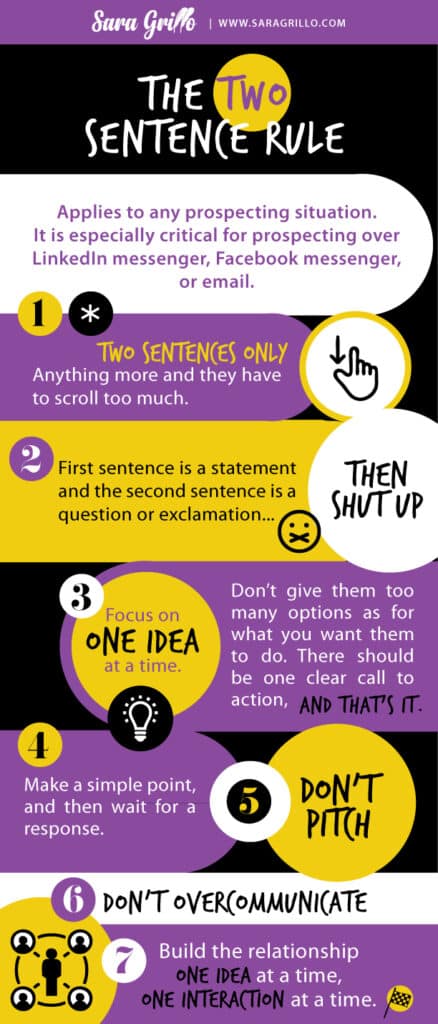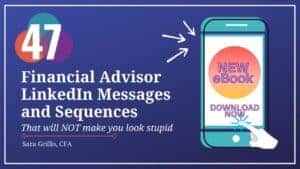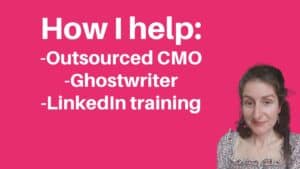Podcast: Play in new window | Download
In this blog/podcast I teach financial advisors about LinkedIn scripts, rebuttals, and client messages that elevate their value. The Two Sentence Rule can potentially enable financial advisors to communicate better with clients and prospects, get more leads over LinkedIn and other social media platforms, and reduce time spent on non-responsiveness, confusion, and back-and-forth.
By the way, thanks for joining me.
For those of you who are new to my blog/podcast, my name is Sara. I am a CFA® charterholder and I used to be a financial advisor. I have a newsletter in which I talk about financial advisor lead generation topics and it is best described as “fun and irreverent.” Please subscribe!
If you’re looking for some straight up talk then you’ve come to the right place!

Two Sentence Financial Advisor LinkedIn Scripts
Thanks for joining me today. Now that we’re past the pleasantries, let’s get to the point of today’s piece. My goal is to answer the following questions:
- How do I reduce confusion when a client is uncertain about something?
- How do financial advisors get a higher response rate with prospects they are messaging over LinkedIn or other social media platforms such as Facebook?
- What is the best way to rebut back when a prospect rejects me without sounding tacky or pushy?
- How do I avoid getting used and abused for my knowledge with a breadcrumbing prospect that I want to impress and get as a client?
- Why don’t clients and prospects see my value?
If you face any of these questions don’t worry because I have the answers! Just read on, or listen to the podcast at the bottom of this page.
Weak communication leads to devaluation
Do you realize that people judge your value by how clearly you communicate?
I have four kids and a business, and people are always marveling at how well I make it work. I’m not going to pretend it’s not stressful. But I’ve learned to manage it. Those who are under high pressure all the time like ER doctors, army helicopter pilots, etc., have no choice but to learn to communicate very effectively.
People are overwhelmed right now given the pandemic, and it’s nothing new. Busy, successful people with alot on their plate always felt this way anyways.
- Do you ever feel like you just can’t handle one more thing?
- Like you have so much BS on your mind, so much damn BS, that steam is literally about to start coming out of your ears?
- Do you ever feel distressed in advance when the phone rings, the doorbell rings, or you see an email from a specific person that you know is going to stress you out? Before you even hear what they have to say you are stressed out.
- Do you ever want to just scream “LEAVE ME ALONE. EVERYONE SHUT UP RIGHT NOW”
Don’t let these distractions of life derail you. You need to be that beacon of clarity, that one person who can cut through all the BS like a knife and settle any situation. High value financial advisors can do this!
Clients and prospects can be so wordy because they are just verbose people, have a lot of time on their hands, are confused, or have lost sight of the idea they are trying to communicate. It’s up to you to bring them back into focus.
You have to gain control of the situation. When conversations are full of words with no connection to actions, it’s trouble. You’re going to waste a lot of everyone’s time. Worst of all, you’ll be devalued; clients and prospects will judge you by your weak communication skills and failure to get the job done.
The #1 determinant of how successful you are is how you invest your time. Period.
-Sara Grillo, CFA
It’s not how smart or experienced you are. And some of you are wasting all day talking, I mean, I see some of you going on and on about things that don’t matter. Not only does it waste time but people are going to judge you as of lower value.
Another way I see high quality financial advisors getting devalued is by doing free work. I’ve seen people do a whole entire estate plan analysis for prospects and then then deal didn’t close. Used and abused. You just did the plan for free, and then you have less time for clients, yourself, your employees, and the prospects who are out there and need you but that you just haven’t had the time to find yet.
But guess what, financial advisors; it’s your fault, not theirs, for not being able to convince them that they needed to pay for your time.
If you don’t see the value of your time (and you can’t communicate it so they get it), don’t expect them to. It’s not the prospect’s job to convince themselves that you shouldn’t work for free; that’s your job.
-Sara Grillo, CFA
Side note: I think all of you should offer your prospects hourly pricing. When you go into a deal, offer to do their financial plan for a fee and that lines you up to ask for the whole portfolio instead of getting breadcrumbed and having them “start with” $25,000 or some amount insignificant to their total portfolioof $2MM because they don’t see your value.
Let’s work on communicating in a way that shows your value!
What is the Two Sentence Rule?
This is directly from my e-book called “47 Financial Advisor LinkedIn Messages and Sequences that will NOT make you look Stupid. “ If you are a financial advisor trying to meet new clients over LinkedIn or other social media sites and you need to know how to put together scripts, you can download it here.

The Two Sentence Rule is described as a method of communication with these qualities:
- Two sentences only. Anything more and they have to scroll too much.
- First sentence is a statement and the second sentence is best a question or exclamation. Then shut up.
- Focus on one idea at a time.
- Don’t give them too many options as for what you want them to do. There should be one clear call to action, and that’s it.
The Two Sentence Rule is of high importance to any financial advisor looking for new clients over LinkedIn, Facebook, or other social media messenger apps. I can’t emphasize enough that the financial advisor’s LinkedIn script has to be two sentences long only.
It’s not just about not making them scroll. The more important aspect of the Two Sentence Rule is that you want to avoid complex communications with someone you don’t know well. This is how communication over messaging apps is different from having a verbal conversation and it’s important to grasp.
The Two Sentence Rule applies to:
- Emails
- LinkedIn messenger
- Phone conversations
- Zoom meetings
- In person meetings
- Prospecting meetings
- Client meetings
The objective of the Two Sentence Rule is to take pressure off you and the other person in the conversation by emphasizing what is important instead of getting distracted by the clutter. In the following section I’m going to teach you how to put together two sentence communications to use with prospects or clients of your RIA firm or financial advisor practice.
How financial advisors may apply the Two Sentence Rule to their LinkedIn scripts, prospecting rebuttals, and client messages
When you are confronted with a communication that is overwhelming, ask yourself these questions.
- What is the most important piece of information I need to give this person? (important info)
- What do I want the person to do? (command)
And then create two sentences that answer those two questions. I came up with the Two Sentence Rule because as someone with four kids under seven years old, I’m naturally confronted with overwhelming situations all the time. Examples:
- You’re going to break your neck. Stop jumping on that couch right now!
The important information – you’re going to get hurt
The command – stop jumping
- I’m not the person who keeps track of the toy car batteries. Ask your father.
The important info – I can’t give you the batteries
The command – ask Antonio
- Stop hitting her. Do you like it when people hit you in the arm like that?
The important info – it doesn’t feel good when people hit you
The command – stop hitting
I’m going to get into it in a minute and show you some examples of how to apply this to your client communications, and I’ll even throw in some prospecting messages and rebuttals. But first I wanted to talk about a tool that can help you.
A quick word about “47 Financial Advisor LinkedIn Messages and Sequences that will NOT make you look Stupid”
I have written other books but this one, 47 Financial Advisor LinkedIn Messages and Sequences that will NOT make you look Stupid, is different.
I hadn’t written a book in about four years. To be honest, I have changed so much and I took a different approach this time. I was looking at it asking myself, “What contribution can I make to this industry that is truly unique? That nobody else has done before?”
The book for Financial Advisors and Linkedin Scripts is not heavily decorated. It’s not artistically written and flowery, it’s straightforward in my no BS fashion. I saw very clearly the goal of this book and it is to give you the words to say to someone you don’t know so you can be perceived as a high quality financial advisor.
In my opinion, nobody in the industry has gotten this right so far. I don’t know of anyone else who has published a book of financial advisor LinkedIn scripts and messages two sentences long. All messages in this book, all 47 of them, are two sentences long.
I see alot of marketing consultants giving financial advisors these paragraph-long LinkedIn scripts to blast over messenger and to be frank I don’t think they’re doing you any favors; in fact I believe they are doing you a disservice.
-Sara Grillo, CFA
Why you should buy my Financial Advisor LinkedIn ebook
I want to be very clear; this is not a Picasso it’s a machine gun. I didn’t write it as a work of rhetorical art or a Socratic debate to read while you lounge around and drink a glass of brandy. It is a weapon with the intension for use in combat. I made it short because I want people to be able to read it over and over again. In fact I want you to read it every single month you are using LinkedIn.
The book really is about the Two Sentence Rule and this is what has come about through my journey as a mother. Because when you have a lot of small children, and especially an autistic child, a child with ADHD, or a child with problems with processing information, you have to be brief and get the point across quickly and you have no choice. The best way to make your point received is to cut it short.
I don’t know how else to say it. I literally gave the reader everything I have on this subject. It is my best work. It is the singular best, most practical, most useful, most powerful thing I have ever written.
I feel that strongly about how important this book is for people.
The link is here.
Please buy this book right now and read it once, read it twice, keep reading it until you figure out how they fit perfectly with the people you are trying to reach.

And now let’s get to some examples of how to apply the Two Sentence Rule. These are based on communications I have had with clients and prospects.
Client is lost – redirect
Client says:
I am trying to see if I should create a version of this newsletter for COIs and Prospects. Most of the market commentary and portfolio updates are not relevant to them. Maybe I can just send out the election section of the article. See attached.
Okay so there are four things going on here making this an overwhelming email to get:
- The client wants to know if it’s necessary to do a whole new project
- Client doesn’t know what is relevant to their audience
- The client needs a solution
- Client wants me to review their article
Here’s how I would respond with the Two Sentence Rule:
Before we get into what to send them, let’s focus on the results. What do you want them to take away from this article after they read it?
Clarifying information – it’s unclear what you want to do
Command – tell me the result you want
Client is struggling – redirect
Client says:
In my brand summary, what I’m trying to describe is “holistic planning.” I’m struggling with this.
Here you want to save the client from swimming in a sea of confusion while trying to bring an abstract concept into tangible terms. Ask them to give you three concrete things and use that as the foundation to work from.
Two sentence response: It sounds as if holistic planning is pretty important to your brand. What do you feel are the three major things that would define this term?
A client is lost – redirect
Client says:
We want to discuss the US workers’ stress/wellness/mental health epidemic. What do you think of this snippet? How else could we pitch this?
Here’s what the client is confused about:
- Too broad a topic spanning too many realms
- Wants me to review it, but the fact he is asking for another pitch implies he’s not completely happy with what he wrote in the first place. So that is setting up an opportunity to waste time.
- Wants additional ideas but the concept is so broad you’d just be scattering into a bunch of different directions.
A good response using the Two Sentence Rule: Before we get into reviewing this, let me ask you one question. Why do you feel there is a need to pitch this another way?
If he doesn’t believe in the article in the first place then why should I waste my time reading it? With my response you are getting to the core of the issue.
Important info – we’re about to waste your time and mine
Command – tell me why you don’t like this piece you wrote
Rebuttal from a prospect rejection
Prospect says:
Good afternoon, Sara. I handle all of the programs for XXX Organization. My Director, Ms. Sandra, forwarded your email on to me regarding your workshop. We currently have an arrangement with Unnamed Brokerage Firm who host virtual seminars. We are not be interested at this time.
Thank you for reaching out to us. Have a good day!
Regards,
Mary Ann
Respond using the Two Sentence Rule: Thanks! Would it be okay to put your name on our email newsletter list so that you may receive our updates on library news and tips?
Their response: Sure, that would be fine.
Success!
As I discuss in my e-book about financial advisor LinkedIn sequences, rejection is often an instinct based upon feeling rather than logic. She doesn’t know how bad she has it at this point, but I’m not going to get in her face and irritate her so she ghosts me, which is what she’ll do because she doesn’t see my value yet.
Notice I don’t argue with the person about how we’re better and she should give us a chance. I’m playing the long game. I’m asking her to keep the door open just enough so I can stay on her radar screen and maybe attempt the pitch again when I have something better or when enough times has passed. Or maybe she’ll come to me when she reads our newsletter. I was able to show my value, which made this a successful rebuttal. I see so many high quality financial advisors that don’t know how to rebut quickly and with skill, and they lose opportunities to lower quality advisors who don’t deserve the business like they do.
Potential breadcrumber
I see financial advisors giving away their time for free all the time. Sometimes it is because you financial advisors have to offer a free portfolio review or free half hour of your time just to get the prospect’s attention. Other times the prospect asks for free time. Either way, if you’re looking to deal with the affluent, which most of you are, they certainly should be able to afford a few hundred dollar consultation fee. And if you are holding yourself out as providing a luxury service to affluent people, you should expect them to treat you as such – a high value service provider. You are not selling washing machines here.
Do you get emails from prospects like this?
Prospect says:
Hi Sara, I hope you are well. I enjoy your videos on Youtube and would really like to learn if it’s possible to move from equity research to private equity. Thank you, name.
My response (one sentence): Are you interviewing?
I ask him a question that enables me to know how to help him best instead of answering the question without knowing anything about him. If he is interviewing, he needs to download my book, and if he’s not interviewing then he needs to have a coaching session with me.
A while ago I learned that free advice isn’t necessarily the best thing for the prospect. It’s not that you are being greedy. Your time has a value and you have to honor it. If you’re just firing back advice for free, you’re probably not spending much time and doing them justice. This is not the deep understanding they need. If they don’t see your advice as worth paying for, how seriously are they going to take it? Are they going to listen to whatever you say anyways? One of the best things I did for people was I figured out I needed to ask people to pay me for my time through PayPal whenever they ask for free advice.
You’d be surprised at how much less important it is for them to get their question answered when I ask them to pay for it. And that’s very elucidating. I’d rather get one sale out of 20 from the qualified buyer than talk all day to 50 unqualified’s and hope one rolls around. When you ask to pay, it’s qualifying them by finding out how serious they are about you. And wouldn’t you rather not spend your time speaking with breadcrumbers who don’t see your value, are “shopping” around, and see no real value in your time?
Given the choice, wouldn’t you rather speak with someone who
- Values your time
- Will pay you because of your hard work
- Is not shopping around but is looking to invest in a relationship
But anyways, back to my story. So then he says:
I have already interviewed and got another job. I was wondering if after a few years of equity research I can still potentially move back private equity.
Two sentence rule-dictated response: This is a more complicated question than I can answer in an email. If you want to set up coaching, let me know.
He says: Sure we can have a coaching session.
Now did I get taken for granted here? Heck no.
It’s your choice, financial advisors! If you’re getting breadcrumbed, it’s because you’ve made the decision to allow people to behave this way. If you’re not on hourly pricing, enable this as an option for your business. And then come up with a great two sentence phrase such as, “To properly answer your question, we would need to put together a 3-5 hour, thorough financial planning analysis that takes into account all of the aspects of your life. We charge $250/hour and you can pay via Stripe or PayPal.” And then just copy and paste whenever you find yourself in a dialogue with a breadcrumbers!
And by the way, are you financial advisors using Calendly? When somebody finally agrees to a meeting with you, don’t complicate it by having to go back and forth agreeing on a date. Just send them your Calendly link.
Sara’s Upshot
What’d ya think? Was this blog about financial advisor LinkedIn scripts helpful?
If yes…

- I am an outsourced CMO for companies who need regular, full service marketing – blogging, social media posts, newsletters, etc.
- I am an hourly consultant for those who just need one-time or recurring guidance
- People hire me as a ghostwriter to write content for a project fee
- I have a social media training program
- I have a book about what to say on LinkedIn messenger
Just letting ya know, in case you need me at some point.
Thanks for reading. I hope you’ll at least join my newsletter about financial advisor lead generation.
See you in the next one!
-Sara G
Music is Nice to You by the Vibe Tracks





